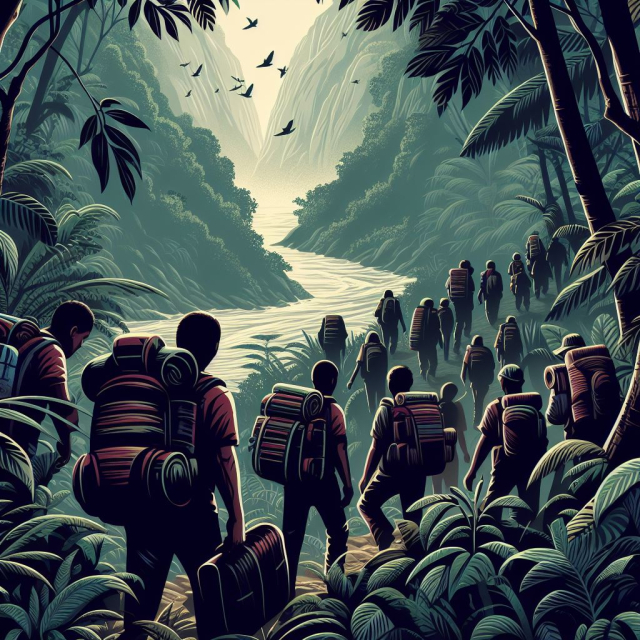Illegal immigration is a complex and multifaceted phenomenon that affects millions of people around the world. From visa restrictions and political conflicts to poverty and lack of economic opportunity, there are a variety of factors that can lead people to emigrate illegally from their home countries in search of a better life elsewhere. In this article, we will explore the reasons and causes of illegal immigration, examining the social, political and economic forces that drive this phenomenon and its impacts on the people and societies involved.
Global Context of Illegal Immigration.
Illegal immigration is a global problem that affects countries in all regions of the world. People may emigrate illegally from their home countries for a variety of reasons, ranging from armed conflict and political persecution to extreme poverty and lack of economic opportunity. In many cases, people are forced to leave their homes due to adverse conditions and desperately seek a better life elsewhere.
Causes of Illegal Immigration.
Poverty and Lack of Economic Opportunities.
One of the main causes of illegal immigration is poverty and lack of economic opportunities in countries of origin. Many people emigrate illegally in search of employment and better living conditions in other countries where they hope to find higher wages and a higher quality of life for themselves and their families. Lack of employment, low pay and lack of access to basic services such as education and health can drive people to seek opportunities abroad, even if it means risking their safety and well-being in the process.
Armed Conflicts and Political Persecution.
Armed conflicts and political persecution are other important causes of illegal immigration. In many cases, people flee their home countries due to violence, political repression, and ethnic or religious persecution. These individuals may be forced to leave their homes and seek refuge in other countries where they hope to find safety and protection from violence and oppression.
Violence and Organized Crime.
Violence and organized crime can also be significant factors driving illegal immigration. In some countries, people may face high levels of violence related to organized crime, including drug trafficking, extortion, and human trafficking. Lack of security and fear of violence can lead people to seek refuge in other countries where they hope to find a safer and more peaceful environment for themselves and their families.
Climate Change and Natural Disasters.
Climate change and natural disasters can also contribute to illegal immigration by displacing people from their homes due to the destruction of their livelihoods and the loss of their natural resources. Events such as droughts, floods and hurricanes can wreak havoc on vulnerable communities and force people to seek refuge elsewhere where they hope to find a safer, more stable environment in which to live.
Visa Restrictions and Immigration Policies.
Visa restrictions and restrictive immigration policies can also contribute to illegal immigration by making legal immigration access difficult for many people. Bureaucratic barriers and onerous requirements can discourage people from applying for legal visas and lead them to choose to immigrate illegally rather than face a complicated and expensive process to obtain legal immigration status in another country.
Search for Family Reunification.
The search for family reunification can also be a motivating factor for illegal immigration. Many people immigrate illegally in an effort to reunite with loved ones who have already emigrated or been displaced to other countries. Separation from family can be a devastating experience and many people are willing to risk their safety and well-being to be close to their loved ones.
Lack of future perspectives.
The lack of future prospects in countries of origin can also contribute to illegal immigration. In some cases, people may feel that they have no opportunities for advancement or development in their home countries and may choose to emigrate illegally in search of a better and more promising life elsewhere. A lack of hope and a sense of stagnation can drive people to seek opportunities abroad, even if it means facing risks and challenges in the process.
Human Trafficking Networks.
Human smuggling networks can also play a significant role in illegal immigration by facilitating the clandestine movement of people across borders. These networks can exploit vulnerable and desperate people by charging exorbitant fees for their services and exposing them to dangerous and abusive conditions during travel. However, for many people, these networks represent a viable option for migrating illegally when they have no other alternatives available.
Illegal immigration is a complex and multifaceted phenomenon that is driven by a number of social, political and economic factors. From poverty and lack of economic opportunity to armed conflict and political persecution, there are a variety of reasons why people may choose to emigrate illegally from their home countries in search of a better life elsewhere. However, it is important to recognize that illegal immigration also presents a number of challenges and risks for the people involved, including exploitation, discrimination and violence. As a global society, it is crucial to address the underlying causes of illegal immigration and work together to find solutions that protect human rights and promote the safety and well-being of all individuals involved.
